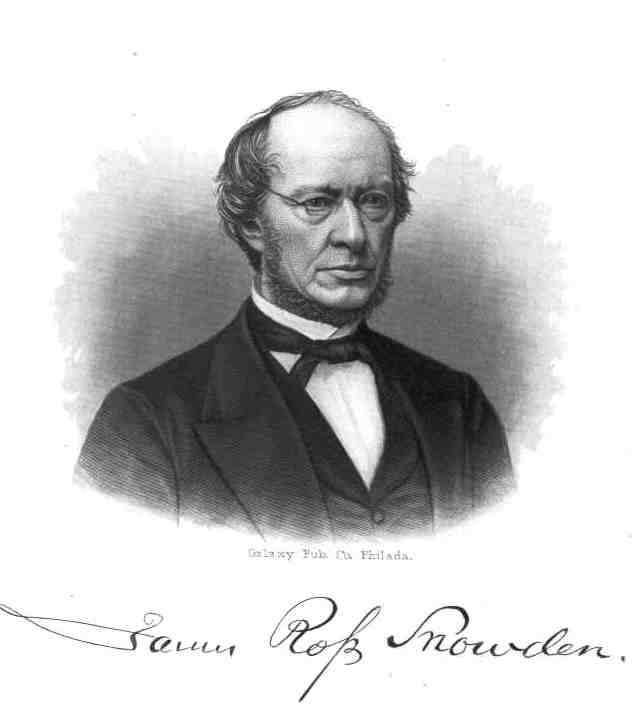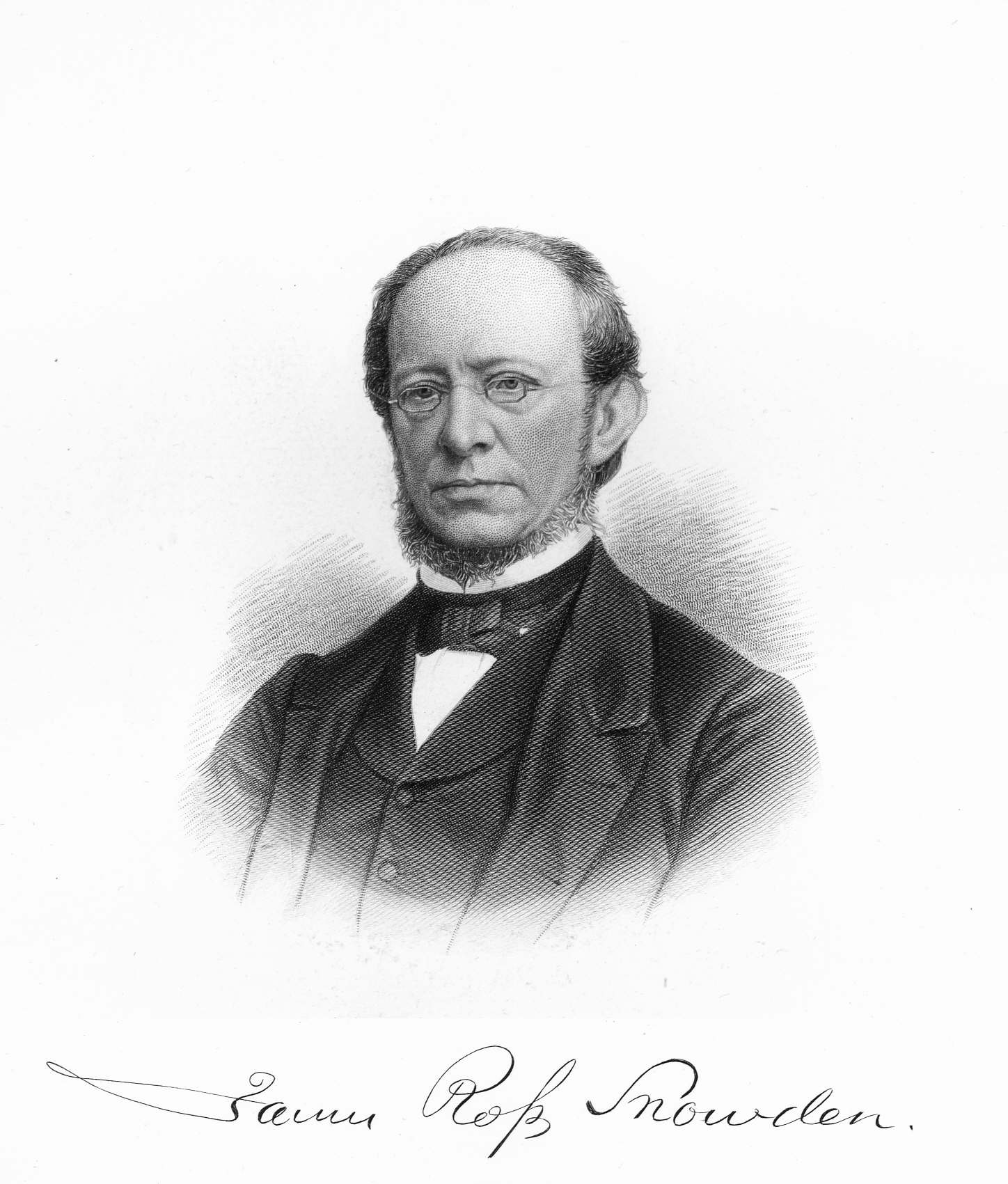Husband James Ross Snowden, LL. D. 1 2

Born: 1810 - Chester, Delaware Co, PA
Christened:
Died: 21 Mar 1878 - Philadelphia, PA 3
Buried:
Father: Rev. Nathaniel Randolph Snowden, D.D. (1770- ) 4 5
Mother: Sarah Gustine (Abt 1774- ) 6 7 8
Marriage:

• Additional Image: James Ross Snowden.
• Biographical Sketch: from Encyclopaedia of Contemporary Biography of Pennsylvania, Vol. 2 (New York: Atlantic Publishing & Engraving Co., 1889).
To read this brief sketch of his life and career, click here.
Wife Susan E. Patterson 9
Born:
Christened:
Died:
Buried:
Father: Maj.-Gen. Robert Patterson ( - ) 9
Mother:
Children
General Notes: Husband - James Ross Snowden, LL. D.
He was one of the early attorneys of Venango County, Pennsylvania. He was descended from one of the oldest families of Penn-sylvania, his ancestor, John Snowden, being the owner of land within the state as far back as 1678. Branches of the family settled about the same time in Virginia and Maryland. Mr. Snowden was the youngest son of Reverend Nathaniel R. Snowden, D. D., who was the first Presbyterian preacher at Harrisburg, to which place he removed from Philadelphia when the state capital was a mere hamlet. His four brothers were lead-ing physicians and his only sister was married to the late James Thompson, chief justice of Pennsylvania. Mr. Snowden was educated at Dickinson College under the tuition of his father, who for many years had charge of that institution. On leaving college he studied law and was admitted to the bar at the early age of nineteen, having removed in the meantime to Frank-lin, Venango county, where he was shortly afterward, appointed deputy attorney general. He subsequently entered public life and for several years represented the Venango district in the state legislature, and was speaker of the house in the years 1842 and 1844.
In 1845 he came within one vote of being nominated for the United States senate by the Democratic party, although at the time he was under thirty-six years of age. The same year he was elected state treasurer and re-elected the following year. His incorruptible integrity at once com-manded the confidence of all parties, and his wise, temperate, but firm pol-icy earned him the reputation of an able and trusted official. In 1846 President Polk tendered him the position of treasurer of the mint, with the assistant treasurership of the United States at Philadelphia, which position he accepted. In 1850 he returned to the practice of the legal profession and was appointed solicitor of the Pennsylvania Railroad Company, which position he subsequently resigned to accept the directorship of the United States mint, tendered him by President Pierce. He filled the position with satisfaction to the government until 1861, when he was appointed prothonotary of the supreme court of Pennsylvania. In 1873 Mr. Snowden resumed the practice of his profession in Philadelphia.
During his many active public duties he was connected with various sci-entific, literary, and historical societies, and as an elder in the Presbyterian church took an active part in the general assemblies of that denomination. He was also a writer of considerable ability. Among his publications may be mentioned the following: "Medals of Washington and National Med-als;" "Biographies of Directors of the Mint, from 1792 to 1861;" "Coins and Money Terms of the Bible," and "Cornplanter, a Memorial Sketch of the Six Nations." At different times he published pamphlets on currency, the national coinage, history, and other subjects. In 1872 Washington and Jefferson College conferred upon him the honorary degree of Doctor of Laws. In all the various responsible positions which he filled, he displayed the best qualities of the honest official, and at all times commanded public esteem and confidence. Respected by those who enjoyed his intimate acquaintance, his life was of service as an example and incentive. [HVC 1890, 174]
JAMES ROSS SNOWDEN, was born in Chester, Delaware County, Pennsylvania, in 1810. He was for some time a student at Dickinson College, at Carlisle. Turning his attention to the study of law, he was called to the bar early, and commenced the practice of his profession in Franklin, Venango County, Pennsylvania. Soon after his admission, he was appointed Deputy Attorney-General; and subsequently, and on repeated occasions, was elected to the Legislature of Pennsylvania. In 1842 and 1844, he was elected Speaker of the House of Representatives. In 1845, he was named by his friends for the office of United States Senator; and in the preliminary meeting of the members of the Legislature, he had on the first ballot the highest number of votes, but not a majority: this was subsequently cast for another citizen. But such was the estimation in which he was held, that at the meeting of the members to nominate a State Treasurer, he was, although no candidate for that office, nominated by a large majority, on the first ballot. He was subsequently elected, and re-elected. A reference to the newspapers and periodicals of that period will show the important work, which he performed in maintaining the credit of the Commonwealth. After the surrender of the office of Slate Treasurer to his successor, he was appointed Treasurer of the United States Mint, and Assistant Treasurer of the United States, at Philadelphia; this was in 1847. These offices he held for several years; and in 1853, he was appointed, on the death of Judge Pettit, who held the office for a brief period. Director of the Mints of the United States, and held that important office until 1861. When Ex-Governor Pollock was appointed to that office in May of that year, there being a vacancy in the office of Prothonotary of the Supreme Court of Pennsylvania, he was unanimously elected to that position by the Judges of the Supreme Court. This office he has held by successive re-appointments, until the present time (1874). In 1860, he published a Description of Ancient and Modern Coins in the Cabinet Collection of the United States Mint; a new edition of the same, with plates, was issued in 1869. Another of his works, which called forth commendatory notices from the most critical reviewers, was a Description of the Medals of Washington; of National and Miscellaneous Medals, and of other objects of Interest in the Museum of the Mint, with Facsimile Engravings and Biographical Notices of Directors of the Mint, from 1792 to 1861. He also published, in 1864, The Coins of the Bible, and its Money Terms; and in 1867, The Cornplanter's Memorial, an Historical Sketch of Gy-Ant-Wa-Chia, the Cornplanter, and of the Six Nations of Indians, with the Report of Samuel P. Johnson, on the erection of the monument at Jennesdaga, to the memory of Cornplanter. He has also, at different times, published addresses, pamphlets on currency, coinage, and other subjects; seven annual Reports of the Mint, and numerous papers in periodicals. There is one pamphlet from his pen, which possesses peculiar interest in view of the subsequent action of the General Government on the subject. It is entitled, A Measure to secure to the People a Safe Treasury and a Sound Currency (published by Benjamin F. Mifflin, 1857). Among the suggestions in this pamphlet did the United States Government, adopt one in 1864, providing for the issuing of Coin Certificates. Mr. Snowden's proposition was to issue certificates on the deposit of gold bullion, as well as of coin. Soon after his admission to the bar, at Franklin, Venango County, he organized a company of volunteer infantry, of which he was Captain; and subsequently, on the formation of a regiment, he was elected Colonel. He presided at the State Military Convention, which met at Harrisburg, in 1845; and was the writer of several papers and memorials, showing the necessity of a more efficient military organization than did then exist. During the late rebellion he was the Lieutenant Colonel, and usually the commanding officer, of the First Regiment of the Infantry of the Philadelphia Home Guards. The regiment was offered for active duty in the field, but their services were not accepted by the Government. In 1845, he received the degree of A. M. from Jefferson College; and in 1872, the Trustees of Washington and Jefferson Colleges conferred on him the honorary degree of Doctor of Laws. He married a daughter of the well-known and distinguished Philadelphian, Major-General Patterson